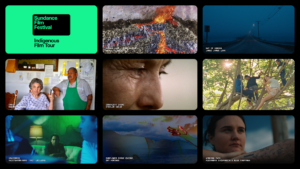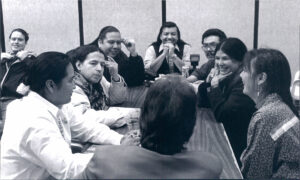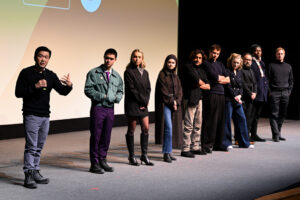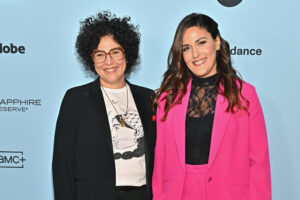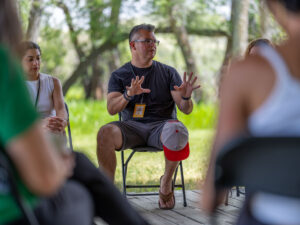by Ianeta Le’i
I honestly don’t remember the first time I met Bryson Chun, but what I do know is that it’s always fun when we catch up. Chun is best known as the Native Hawaiian (born and raised on the Windward side of O’ahu) screenwriter whose credits include Disney+’s Doogie Kamealoha, M.D. and the upcoming Moana 2, but to me and the Sundance Institute, he’s like family, despite graduating from one of my rival high schools, Kamehameha Schools Kapālama.
Not long after we start downloading each other on our kids and work, the conversation naturally veers into Portuguese sausage and the McDonald’s breakfast that his dad just picked up for him. This is not an advertisement, but we both agreed that for those of you who have not yet been to Hawai’i, you should know that the McDonald’s breakfast menu offers quintessential local fare — Portuguese sausage, eggs and rice, complete with Aloha Shoyu (soy sauce) packets. “I don’t even eat fast food, but that’s not fast food,” he says with confidence, over Zoom, and rightfully so.
So, if you want to start your day like an award-winning writer, now you know the secret. A 2021 Native Lab Fellow, Chun’s tenure with Sundance Institute actually began in 2016 as a selectee of the Sundance Native Writer’s Workshop which was held in Honolulu. He is also an Advisor for the upcoming Indigenous Intensive x Hawai’i, held on O’ahu August 13–15, which provides mentorship, support, and a grant to five Native Hawaiian fellows. The inaugural Intensive is made possible with partnership and support by Linda and Robert Nichols and Creative Industries HI.
To commemorate the Indigenous Program’s return to Hawai’i with our newly launched Indigenous Intensive next month, I sat down with Bryson to “talk story” (chat) about his experience as a Native Hawaiian Indigenous Program alumni.
Tell me about your experience as a Native Lab Fellow.
It was amazing! I was at a crossroads…and wondering if I could be a filmmaker. I had written this script (Ka Piko) and it was one of those things where nobody was interested in making it. I felt like, “Maybe I won’t be a filmmaker at all,” but on a whim I submitted to Sundance and thought I’d just see what happens. I ended up getting in, and it was incredibly validating for me — as someone who thought maybe filmmaking or writing wasn’t a career for me — to have Sundance be like “No you’re actually worthy of doing this, and your voice is valued.” So to be part of that lab was incredible, and to do it in Hawai’i was awesome.
What did you do after the lab, and how did it shape your trajectory as a filmmaker?
What was really great about it was that Adam [Piron] and the mentors were so adamant about me making that film, and very encouraging to not just let it be a script, but go out there and actually make it. Whether you have money or not, take your phone and go film. It’s ready to go and you should be making it.
It was empowering for me to [know that my] project does not just exist in a vacuum, but they want me to make it and were very supportive of that journey. So it was incredible for me, and that short, to this day, still gets screened in places and people talk to me about it. So even eight years later, Sundance still has a big impact on my life.
What were you doing at the time of your fellowship?
Sundance was the gateway for me, I really followed a fellowship track [with the workshop] and was able to get into the Native Lab later down the road, and CAPE [Coalition of Asian Pacifics in Entertainment] among others. With all of those things, it helped me to get on the Dougie Kamealoha show,which I got staffed on the second season, and was able to parlay that into being a writer on the upcoming Moana 2. So I worked on that for a long time at Disney animation, which was super fun and super hard, but I think it’s an incredible project that’s coming out and now I’m very excited to be in the process of trying to write and develop my own stuff…In particular, I’d love to bring back a show to Hawai’i. I feel like there’s a gap for that, so that’s the ultimate goal of what I’m trying to do right now.
Was Dougie Kamealoha, M.D. the first writer’s room you’ve been in? What was it like?
Yes it was. It was incredible — I actually felt very welcomed there, the room was very warm and full of incredibly funny and talented people.
Were there other Native Hawaiian writers?
Of course not [laughs], but everyone was so great! But I was the only one. It was exciting for me because my voice was really respected in the room, and we got to pursue certain storylines that we wouldn’t have been able to do because I was there and had that insight. Others [in the room] grew up in Hawai’i, but I think having a Native Hawaiian to help tell the story of a Native Hawaiian family was helpful. I felt like my voice was valued there, which I appreciated.
What do you feel is the most helpful part of being involved with Sundance Institute? If you’re trying to work in the industry, a lot of times you feel like you have to be something you’re not, and try to capture something other shows or movies are capturing — something broad and relatable for other people…Sundance helps empower you to be yourself and tell the stories that are meaningful to you, and help you feel like your voice and unique perspective matters. They encouraged me to tell weird stories, and tell things that feel very specific. In a weird way, the more specific you are, the more that material resonates with people. I think going through [the Indigenous] Program and just feeling empowered to tell things that are true to me, felt really amazing.
What advice would you give the intensive fellows coming in this year?
I have two things: one, is that it’s a long journey, and Sundance is a huge first step, but it’s still one part of a very long journey, and it’s okay to not be great immediately. I think we have these expectations put on us when we’re Indigenous or a person of color, like we only get one shot and we’re done, so if we mess up or something we make sucks, it’s over. But I don’t think that’s true. I think that we need to be able to do a lot of things and make mistakes… [as other] people are allowed to make mistakes all the time and build entire careers on making bad stuff. So I feel we need to be empowered and feel free to be bad at things and it takes time to be good and not to give up before you get there.
The second thing — I’m such a huge fan because of Sundance and all the opportunities that I’ve had — is mentorship. Find someone or a community of people that are one step ahead that you can ask for advice or people that can help mentor you. The worst someone can say is no, but it’s always worth it to shoot your shot and ask people for help. I think we’re afraid to do that kind of stuff, but then again, in Hollywood, people do it all the time. It’s like we’re too shy to do that — especially in Hawai’i — we don’t know how to ask for things, and ask for help but I think it’s incredibly valuable.





